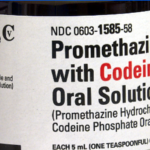Can I Buy Phenergan (Promethazine) Over The Counter?

Over-the-counter medicine is also known as OTC or nonprescription medicine. All these terms refer to medicine that you can buy without a prescription. They are safe and effective when you follow the directions on the label and as directed by your health care professional.
In the United States, the Food and Drug Administration decides whether a medicine is safe and effective enough to sell over-the-counter. This allows you to take a more active role in your health care. But you also need to be careful to avoid mistakes. Make sure to follow the instructions on the drug label. If you don’t understand the instructions, ask your pharmacist or health care provider.
What is Phenergan (promethazine)?
Phenergan is a brand of promethazine, a medication used to treat several conditions, including allergies, motion sickness, nausea and vomiting, anxiety before surgery, and pain after surgery. It’s also used as a sleep aid, including before and after surgery.
This drug may be used as part of a combination therapy. That means you may need to take it with other medications. Phenergan comes as an oral tablet, an oral solution, an injectable solution, and a rectal suppository.
Phenergan oral tablet is only available as a generic drug. Generic drugs usually cost less than brand-name versions. It is also known by the trade name Sominex.
How it works
Phenergan (promethazine) belongs to a class of drugs called phenothiazines. A class of drugs is a group of medications that work in a similar way. These drugs are often used to treat similar conditions.
Phenergan (promethazine) works by preventing the release of a substance called histamine from certain cells in your body. Histamine is normally released when you’re exposed to things you’re allergic to, such as pollen, dander, mold, or chemicals.
By preventing the release of histamine, this drug causes sleepiness and helps with pain control. This is because histamine helps regulate wakefulness and helps to keep you alert and your senses heightened.
This drug also works to reduce stimulation of the part of your brain that sends signals to make you vomit.
How should Phenergan (promethazine) be used?
Promethazine comes as a tablet and syrup (liquid) to take by mouth and as a suppository to use rectally.
Typical dosing for promethazine
• Allergies: Promethazine can be taken a few different ways to treat allergies. You can take 25 mg by mouth or rectally at bedtime OR 12.5 mg by mouth or rectally before meals and at bedtime OR 6.25 to 12.5 mg by mouth or rectally 3 times a day as needed.
• Allergic reactions: The typical dose is 25 mg injected into a muscle as soon as possible after the reaction starts. This can be repeated every 2 hours if needed.
• Motion sickness in adults: The typical dose is 25 mg by mouth or rectally 30 to 60 minutes before traveling. You can repeat this every 8 to 12 hours as needed. If you need to take it daily (for example, while on a cruise), you would typically take 25 mg by mouth or rectally two times a day (first thing in the morning and after your evening meal).
• Motion sickness in children: The typical dose is 12.5 to 25 mg by mouth or rectally up to twice a day.
• Nausea and vomiting in adults: The typical dose is 12.5 to 25 mg by mouth, rectally, or injected into a muscle every 4 to 6 hours as needed.
• Nausea and vomiting in children (dose based on weight): The typical dose is 0.5 mg per pound of body weight by mouth or rectally. It should be given as little as possible, but no more than every 4 hours.
• Sedation in adults: The typical dose is 25 to 50 mg by mouth, rectally, or injected into a muscle before sleep. If you are taking this to treat anxiety before surgery, the dose is usually 50 mg by mouth or rectally the night before your procedure.
• Sedation in children: The typical dose is 12.5 to 25 mg by mouth, rectally, or injected into a muscle before sleep.
• Anesthesia: The typical dose is 25 to 50 mg injected at the same time as other anesthesia medications. This dose might be changed or repeated by your surgeon or anesthesiologist.
Follow the directions on your prescription label carefully, and ask your doctor or pharmacist to explain any part you do not understand. Take promethazine exactly as directed. Do not take more or less of it or take it more often than prescribed by your doctor.
Promethazine suppositories are for rectal use only. Do not try to swallow the suppositories or insert in any other part of your body.
If you are taking promethazine liquid, do not use a household spoon to measure your dose. Use the measuring spoon or cup that came with the medication or use a spoon made especially for measuring medication.
To insert a promethazine suppository, follow these steps:
1. If the suppository feels soft, hold it under cold, running water for 1 minute. Remove the wrapper.
2. Dip the tip of the suppository in water.
3. Lie down on your left side and raise your right knee to your chest. (A left-handed person should lie on the right side and raise the left knee.)
4. Using your finger, insert the suppository into the rectum, about 1/2 to 1 inch (1.25 to 2.5 centimeters) in children who are 2 years of age older and 1 inch (2.5 centimeters) in adults. Hold it in place for a few moments.
5. Stand up after about 15 minutes. Wash your hands thoroughly and resume your normal activities.
Other uses for this medicine
This medication may be prescribed for other uses; ask your doctor or pharmacist for more information.
Can a pregnant or breastfeeding woman take Phenergan (promethazine)?
No, pregnant women and breastfeeding mothers should avoid taking Phenergan (promethazine) because exposing an unborn child to Phenergan (promethazine) two weeks to delivery may lead to temporary changes to the baby’s nervous system that can affect their behavior for a few days after birth, the baby may cry more, be jittery, respond differently to stimuli, and be harder to settle.
What are the side effects of Phenergan (promethazine)?
Phenergan (promethazine) can cause side effects. Tell your doctor if any of these symptoms are severe or do not go away:
• abnormally happy mood
• blurred or double vision
• difficulty falling asleep or staying asleep
• dizziness
• drowsiness
• dry mouth
• hyperactivity
• itching
• listlessness
• loss of coordination
• nausea
• nervousness
• nightmares
• restlessness
• ringing in ears
• stuffy nose
• vomiting
Some side effects can be serious. If you experience any of the following symptoms, call your doctor immediately:
• abnormal neck position
• abnormal or uncontrollable movements
• breathing stops for a short time
• confusion
• decreased alertness
• difficulty breathing or swallowing
• faintness
• fast or irregular pulse or heartbeat
• fever
• hallucinations (seeing things or hearing voices that do not exist)
• hives
• hoarseness
• inability to respond to people around you
• overwhelming or unmanageable fear or emotion
• rash
• seizures
• slowed breathing
• sore throat, fever, chills, and other signs of infection
• stiff muscles
• sweating
• swelling of the face, eyes, lips, tongue, throat, arms, hands, feet, ankles, or lower legs
• tongue sticking out
• uncontrollable shaking of a part of the body
• uncontrolled eye movements
• unusual bruising or bleeding
• wheezing
• yellowing of the skin or eyes
If you experience a serious side effect, you or your doctor may send a report to the Food and Drug Administration’s (FDA) MedWatch Adverse Event Reporting program online (http://www.fda.gov/Safety/MedWatch) or by phone (1-800-332-1088).
Phenergan (promethazine) may cause other side effects. Call your doctor if you experience any unusual problems while you are taking this medication.
Is there an over-the-counter Phenergan (promethazine)?
No, there is no over-the-counter Phenergan (promethazine) as the medication is a prescription-only medicine that requires a medical consultation with a doctor before it can be prescribed. This is because Phenergan (promethazine) can be potentially harmful to some patients with specific conditions and or certain medications.
To help avoid interactions, your doctor should manage all of your medications carefully. Be sure to tell your doctor about all medications, vitamins, or herbs you’re taking. To find out how this drug might interact with something else you’re taking, talk to your doctor or pharmacist.
Examples of drugs that can cause interactions with promethazine are listed below.
Allergy drugs
When you take certain allergy drugs with promethazine, you may have increased side effects. These can include dry mouth, constipation, trouble emptying your bladder, blurred vision, and drowsiness. Examples of these drugs include:
• brompheniramine
• carbinoxamine
• chlorpheniramine
• clemastine
• cyproheptadine
• diphenhydramine
• hydroxyzine
Antidepressant drugs
If you take certain antidepressant drugs called monoamine oxidase inhibitors (MAOIs) with promethazine, you raise your risk of extrapyramidal symptoms. These symptoms include uncontrollable upward staring, eye and lid twitching, uncontrollable neck muscle contractions (causing your head to twist or turn to one side), and sticking out your tongue uncontrollably.
Examples of these drugs include:
• isocarboxazid
• phenelzine
• tranylcypromine
Promethazine can cause severe drowsiness. When you take drugs called tricyclic antidepressants with promethazine, you may have drowsiness that is more extreme and lasts longer. Examples of these drugs include:
• amitriptyline
• amoxapine
• clomipramine
• desipramine
• doxepin
• imipramine
• nortriptyline
• protriptyline
• trimipramine
Anxiety drugs
Promethazine can cause severe drowsiness. When you take certain anxiety drugs with promethazine, you may have drowsiness that is more extreme and lasts longer. Examples of these drugs include:
• chlordiazepoxide
• clonazepam
• clorazepate
• diazepam
• lorazepam
• oxazepam
Bladder control drugs
When you take certain bladder control drugs with promethazine, certain side effects may increase and last longer. These side effects include dry mouth, constipation, trouble emptying your bladder, blurred vision, and drowsiness. Examples of these drugs include:
• darifenacin
• flavoxate
• oxybutynin
• solifenacin
• tolterodine
• trospium
Muscle relaxants
Promethazine can cause severe drowsiness. When you take certain muscle relaxants with promethazine, you may have drowsiness that is more extreme and lasts longer. Examples of these drugs include:
• baclofen
• chlorzoxazone
• cyclobenzaprine
• dantrolene
• metaxalone
• methocarbamol
• orphenadrine
• tizanidine
Nausea and motion sickness drugs
When you take certain nausea and motion sickness drugs with promethazine, certain side effects may increase and last longer. These side effects include dry mouth, constipation, trouble emptying your bladder, blurred vision, and drowsiness. Examples of these drugs include:
• dimenhydrinate
• meclizine
• scopolamine
Pain drugs
Promethazine can cause severe drowsiness. When you take certain pain drugs with promethazine, you may have drowsiness that is more extreme and lasts longer. Examples of these drugs include:
• codeine
• fentanyl
• hydrocodone
• hydromorphone
• levorphanol
• meperidine
• methadone
• morphine
• oxycodone
• oxymorphone
• tramadol
Parkinson’s disease drugs
When you take certain Parkinson’s disease drugs with promethazine, some side effects may increase and last longer. These side effects include dry mouth, constipation, trouble emptying your bladder, blurred vision, and drowsiness. Examples of these drugs include:
• benztropine
• trihexyphenidyl
• amantadine
Seizure drug
Promethazine can cause severe drowsiness. Taking phenobarbital with promethazine can cause drowsiness that’s more extreme and lasts longer.
Sleep medications
Promethazine can cause severe drowsiness. When you take certain sleep aids with promethazine, you may have drowsiness that’s more extreme and lasts longer. Examples of these drugs include:
• chloral hydrate
• estazolam
• eszopiclone
• flurazepam
• temazepam
• triazolam
• zaleplon
• zolpidem
Stomach and gastrointestinal drugs
When you take certain stomach and gastrointestinal drugs with promethazine, certain side effects may increase and last longer. These side effects include dry mouth, constipation, trouble emptying your bladder, blurred vision, and drowsiness. Examples of these drugs include:
• belladonna alkaloids/phenobarbital
• glycopyrrolate
• hyoscyamine
• methscopolamine
• scopolamine





